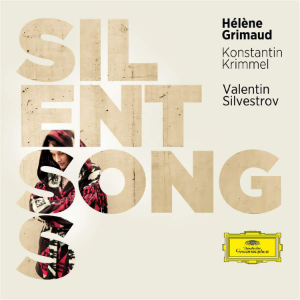
Valentin Silvestrov (b. 1937)
Silent Songs (1977), selection
Konstantin Krimmel (baritone)
Hélène Grimaud (piano)
rec. live, 31 August 2022, Turbine Hall on the Stienitzsee, Berlin
Notes in English and German, Russian texts and one Ukrainian text (in Cyrillic) with English translations
Deutsche Grammophon 4864104 [56]
Valentin Silvestrov’s Silent Songs set verses by Russian poets, an excerpt in Ukrainian by Taras Shevchenko, and Russian translations of Keats and Shelley. Hélène Grimaud discovered the collection almost twenty years ago when she received a recording of the complete song cycle as a birthday gift. She took up some of Silvestrov’s piano pieces and began a long search for the ideal voice to partner her in Silent Songs. She eventually found award-winning German-Romanian baritone Konstantin Krimmel (born 1993). It is a very successful partnership in this music.
Silvestrov has long been the senior composer of Ukraine. Silent Songs are a consistent group of quietly contemplative settings of mostly very well-known texts. The poetry is the point itself, not the starting point for music that will interpret and dramatise the text. The tempo ranges only from largo to moderato, dynamics are soft, the piano doubles the voice as an equal melodic partner, and the voice, the composer asks, “should not stand out from the piano but […] emerge as if from the depths of the piano sound. The singer should sing as if attentively listening to himself.” The full collection plays for two hours, and Silvestrov asks for it to performed with no interval, “as a single song”.
This selection of a dozen songs draws mostly on Russian classics – Pushkin (four songs), Baratynsky (two), Yesenin (two) and Mandelstam (one) – plus one by Shevchenko in Ukrainian and one each of Keats and Shelley in Russian translation. The songs foreground the poem – if these texts or excerpts were lost, they could be reconstructed from the settings – but not the poet. It all sounds rather the same in terms of the musical treatment. If you know no Russian, even Keats’s much anthologised poem sounds like Pushkin: the ballad gets a semi-strophic treatment but there is no menace of the sort the eerie tale implies. Pushkin’s lyrical ” has in fact slightly more drama at the outset.
The pianist has several solo contributions between and after the sung verses. There are Schumannesque piano postludes (e.g. in songs 1 and 7) and a one-minute interlude in song 11 plus a near thirty-second postlude. The piano is as much duetting with the voice as accompanying it – the left-hand chords can still hint at accompaniment – but these interchanges between voice and instrument are a key part of the style. Hélène Grimaud certainly sounds as much engaged in this music as her partner.
Konstantin Krimmel is outstanding. The excellent voice, with its rich focussed timbre, is blessed with a honeyed mezza-voce. The continuous lyrical lines are beautifully sustained. In music that aims to seduce, but never stun or surprise, he perfectly finds variety in the seeming monotony. There has been no cycle like this ever, and certainly not in modern times. Its cumulative effect lingers in the mind. This live performance appears to be a complete success, well recorded and documented. But beware, if it is for you, then you might be tempted to go for the full-length version on two ECM discs (review).
Roy Westbrook
Help us financially by purchasing from


Contents
Song can heal the ailing spirit (Baratynsky) 3:36
There were storms and tempest (Baratynsky) 4:05
La belle dame sans merci (Keats) 6:18
O melancholy time! Delight for eyes! (Pushkin) 3:05
Farewell, O world, farewell, O earth (Shevchenko) 4:49
I will tell you with complete directness (Mandelstam) 3:27
Here’s a health to thee, Mary (Pushkin) 5:43
Winter Journey (Pushkin) 5:41
The Isle (Shelley) 4:16
Autumn Song (Yesenin) 4:45
Swamps and marshes (Yesenin) 4:54
Winter Evening (Pushkin) 5:37


















